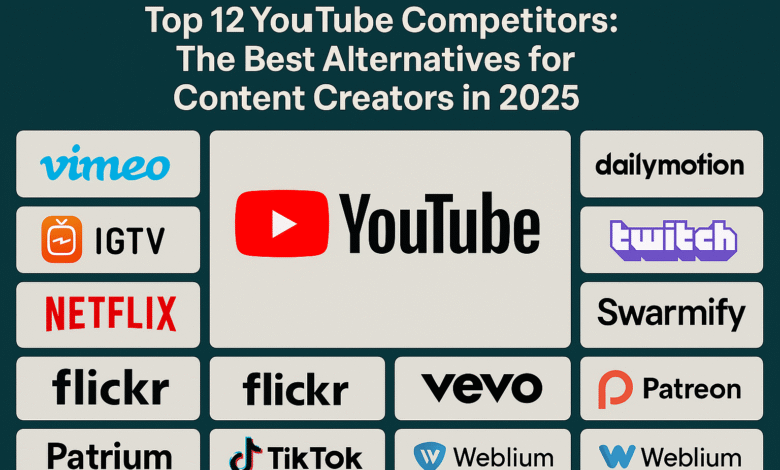Top 12 YouTube Competitors for Creators in 2025

YouTube is undeniably the biggest video-sharing platform in the world, boasting over 2 billion users. With 500 hours of content uploaded every minute, it dominates the global video space. However, many content creators and viewers are looking for alternatives due to YouTube’s strict content policies, demonetization concerns, and high competition.
Luckily, there are several YouTube competitors that offer excellent features for creators and viewers alike. Whether you are a video blogger, musician, educator, or business owner, these platforms can help you share your content, reach new audiences, and even earn money.
In this article, we’ll explore 12 of the top YouTube competitors and what they bring to the table for today’s content creators.
Table of Contents
Toggle1. Vimeo — Leading Among YouTube Competitors
Launched in 2004, Vimeo is one of the most respected YouTube competitors, especially among professionals. It’s known for delivering high-quality, ad-free videos with a clean interface. Brands, filmmakers, and musicians frequently use Vimeo for polished video presentations.
Key Features of Vimeo:
-
Multiple subscription plans
-
Professional live streaming
-
Integrated video editor
-
Advanced analytics for each video
2. Dailymotion — An International YouTube Rival
Dailymotion was created in 2005 and serves as a direct alternative to YouTube. With support for 18 languages and over 110 million monthly users, it is popular for educational and informative content.
Why Dailymotion Stands Out:
-
HD video uploads
-
Categorized and searchable content
-
Emphasis on useful and educational videos
3. Twitch — The Live Streaming Powerhouse
Owned by Amazon, Twitch has evolved into one of the top YouTube competitors, focusing on live video game streams, eSports, and creative content. With more than 1.6 million users online at any given time, Twitch has become a cultural force.
Twitch Highlights:
-
Real-time streaming and interaction
-
Strong monetization options for streamers
-
Predominantly younger, male audience
4. Metacafe — A Pioneer Among YouTube Competitors
Even older than YouTube, Metacafe debuted in 2003. It became known for short, funny, and viral videos. Though it’s less mainstream today, it still appeals to users interested in entertainment, sports, and pop culture.
Top Metacafe Features:
-
Short-form video focus
-
15+ diverse content categories
-
Brand integration options
5. IGTV — Instagram’s Video Platform
IGTV, part of the Instagram ecosystem, allows longer video uploads than standard Instagram posts. Launched in 2018, it appeals to users already active on Instagram.
IGTV Benefits:
-
Embedded within Instagram
-
Personalized video recommendations
-
Free to use with simple setup
6. Netflix — A Premium Video Alternative
While not a traditional YouTube competitor, Netflix remains a dominant force in online video content. With exclusive series, movies, and documentaries, it attracts users looking for premium entertainment.
Netflix Features:
-
Paid subscriptions with a trial period
-
Downloadable content for offline viewing
-
Exclusive, high-quality original productions
7. Swarmify — A Fast Business Video Hosting Solution
Swarmify is more focused on businesses and website integration than general users. It offers lightning-fast video loading and seamless WordPress integration.
Why Choose Swarmify:
-
Distraction-free, branded video playback
-
Automatic conversion of YouTube content
-
Optimized for websites and eCommerce
8. Vevo — Music-Focused YouTube Competitor
Vevo is ideal for artists, musicians, and producers looking to distribute their official music videos. With strict copyright controls and a strong network of partners, it’s a trusted platform for music content.
Key Vevo Advantages:
-
Collaborations with top music labels
-
High-quality, verified music content
-
Extensive global reach
9. Flickr — A Visual Platform Turned Video Host
Flickr may be best known for photo sharing, but it’s also one of the more overlooked YouTube competitors for video uploads. Founded in 2004, Flickr allows users to upload short videos alongside their photos.
What Flickr Offers:
-
Videos up to 10 minutes long
-
90 million monthly users
-
Paid Pro plans with advanced analytics
-
Ideal for visual artists and photographers who also shoot video
10. TikTok — The Viral Video Sensation
TikTok emerged as a global phenomenon in 2019 and continues to grow rapidly. As one of the most dynamic YouTube competitors, it allows users to create and share short-form videos with music, effects, and filters.
TikTok Features:
-
Enormous potential for virality
-
Highly engaged teen and young adult audience
-
Great for creators of humorous or creative content
-
Multiple monetization tools including brand deals, live gifts, and creator funds
11. Patreon — A Funding Platform for Content Creators
Though not a video-sharing site per se, Patreon is essential for monetizing creative work. It allows fans (patrons) to support their favorite creators with monthly subscriptions or one-time donations.
Why Patreon is a Valuable YouTube Alternative:
-
Open to all types of creators, including vloggers, musicians, writers, and podcasters
-
Tiered membership options for exclusive content
-
Creators keep control over their content and audience
-
Monetization without relying on ads
12. Weblium — Build Your Own Platform
Weblium is not a typical YouTube competitor, but it’s a powerful tool for creators who want to build their own websites and host videos independently. With SEO-friendly templates and media integration, Weblium offers freedom from platform restrictions.
Weblium Highlights:
-
Full control over branding, layout, and content
-
Ability to monetize through ads, products, or partnerships
-
No algorithms or competition interfering with your views
-
Ideal for creating video portfolios and business channels
Summary: Choosing the Right YouTube Competitor
While YouTube remains the leading video platform, the digital world now offers creators more choices than ever. These 12 YouTube competitors give you the chance to reach new audiences, avoid YouTube’s rigid policies, and build a brand in a way that suits your content and goals.
Some platforms, like Vimeo and Vevo, are perfect for professionals in music and film. Others, like Twitch and TikTok, cater to live streamers and viral video creators. Meanwhile, tools like Patreon and Weblium let you monetize and control your own distribution without relying on any major platform.
Choosing the right YouTube competitors depends on what you create, who your audience is, and how you want to grow your presence.
FAQs About YouTube Competitors
Q1: Why are creators looking for YouTube competitors?
A: Many creators feel limited by YouTube’s strict policies, demonetization issues, and high competition. Alternative platforms often offer more creative freedom, better monetization models, and niche communities.
Q2: Which YouTube competitors are best for monetization?
A: Twitch, TikTok, and Patreon provide excellent monetization opportunities through subscriptions, live donations, creator funds, and brand collaborations.
Q3: Is it hard to move away from YouTube?
A: Transitioning from YouTube to other platforms requires effort, but if you build your brand and audience consistently, success is possible elsewhere—especially on platforms like Vimeo, TikTok, or Patreon.
Q4: Are YouTube competitors safe and trustworthy?
A: Most of the major platforms like Dailymotion, Vimeo, Twitch, and TikTok are safe. Always read their terms of service and privacy policies to ensure your content and data are protected.
Q5: Can I use multiple YouTube competitors at the same time?
A: Yes, and it’s even recommended. Repurposing your content across different platforms increases your exposure and helps you reach diverse audiences.
Q6: Why is YouTube still the biggest video platform?
A: YouTube benefits from Google’s infrastructure, massive search engine visibility, and billions of users. It also offers robust tools for creators. However, that doesn’t mean alternatives can’t compete in niche areas.
Q7: Is Twitch better than YouTube for gaming content?
A: For live gaming content, Twitch is the better platform due to its interactive features and dedicated audience. YouTube is still good for edited gaming videos or tutorials.
Q8: What’s the best alternative for music creators?
A: Vevo and Vimeo are great for music creators. Vevo partners with major labels, while Vimeo supports high-quality video uploads and embeds.
Read also:Transforming Customer Service: Call Center Outsourcing with Garage2Global

